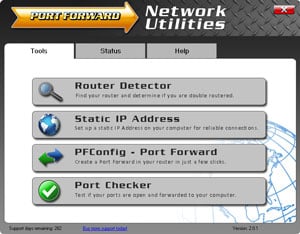Sitecom DC-201 routers include a very basic firewall that helps protect your home network form unwanted access from the internet. Since this firewall blocks incoming connections you may need open a port through it for certain games and applications. This process of opening a port is frequently called a port forward, since you are forwarding a port from the internet to your home network.
The basic process to open a port is:
- Setup a static IP address on either your computer or device that you want to forward a port to.
- Login to your Sitecom DC-201 router.
- Navigate to the port forwarding section.
- Click the Advanced Internet link.
- Click the Virtual Server Enable radio button.
- Click the User-Defined Virtual Servers link.
- Create a port forward entry.
While these steps might seem difficult at first, we will walk you through each step for your Sitecom DC-201 router.
We think that forwarding a port should be easy. That's why we created Network Utilities. Our software does everything that you need to forward a port.
When you use Network Utilities you get your port forwarded right now!
Step 1
It is important to setup a static ip address in the device that you are forwarding a port to. This ensures that your ports will remain open even after your device reboots.
- Recommended - Our free Static IP Setter will set up a static IP address for you.
- Another way to get a permanent IP address is to set up a DHCP reservation.
- Or, manually create a static ip address with our Static IP Guides.
This step is important because you want a permanent IP address in your device. If you do not set up a permanent IP address in your device, then when you device reboots it may get a new IP address.
Use a VPN Instead
Have you considered using a VPN instead of forwarding a port? For most users, a VPN is a much simpler and more secure choice than forwarding a port.

We use and recommend NordVPN because not only is it the fastest VPN, it includes a new feature called Meshnet that makes forwarding a port no longer necessary for most applications. With NordVPN Meshnet, you can connect to your devices from anywhere in the world, completely secure, over a highly encrypted VPN tunnel.
Every time you click on one of our affiliate links, such as NordVPN, we get a little kickback for introducing you to the service. Think of us as your VPN wingman.
Step 2
Now we are going to login to your Sitecom DC-201 router. Your router has a web interface, so you will login to it using your web browser. This can be either Chrome, Firefox, Internet Explorer, or Edge. It usually does not matter which browser you choose to use.
Open up your web browser and find the address bar. It should look something like this:

Above is an example of what a web browser address bar looks like. Find the address bar in your router and type in your router's IP address.
The default Sitecom DC-201 IP Address is: 192.168.0.1
After entering the IP address of your router you can simply press enter. If all goes well you will see the following screen:
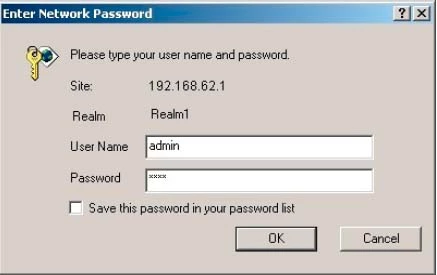
You should see a box prompting you for your username and password.
- The Default Sitecom DC-201 Router Username is: blank
- The Default Sitecom DC-201 Router Password is: blank
Enter your username and password, and then click the Login button to log in to your Sitecom DC-201 router.
Sitecom Usernames and Passwords
If your username and password do not work then please visit our Default Sitecom Router Passwords page.
If you still can't login to your router because you forgot your Sitecom DC-201 router username and password, use our How to Reset a Router Password guide to set your Sitecom DC-201 router back to its factory settings.
Step 3
Now we need to find the port forwarding section in your router. Here's how you do it. Starting from the first page in your router:
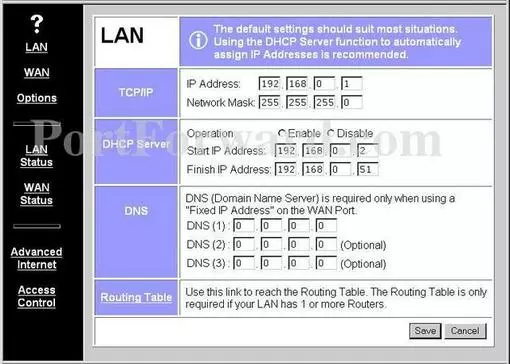
Click the Advanced Internet link near the left of the page.
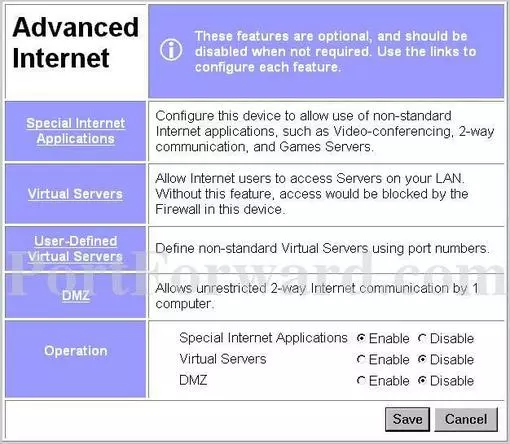
Put a dot into the Virtual Server Enable radio button.
Click the User-Defined Virtual Servers link near the center of the page.
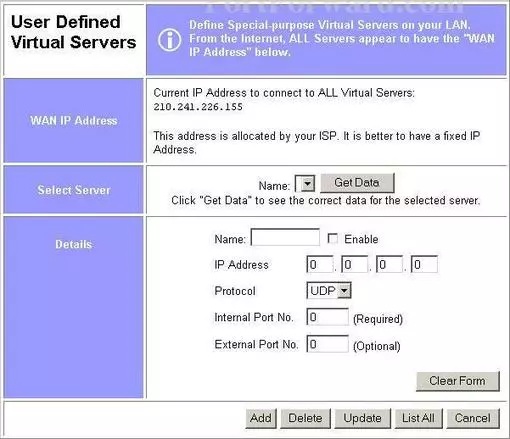
Step 4
Here are the ports to forward for Xbox Live:
- TCP Ports: 3074
- UDP Ports: 3074
If you are looking for the ports for a different application you can find it by either:
- Browsing our List of Games
- Check out our our List of Games by Genre
- See our List of all Applications
Don't forget to sign up for NordVPN's promo deal before it's gone.

You might notice that most of our site doesn't have ads on it. This is because we use partnerships with companies like NordVPN to keep the site running. Thank you for supporting us by using our referral links.
Click the Clear Form button.
You need to name this entry in the Name box. The name does not make any difference in the forward; it's just there so that you can remember later why you setup this forward.
Put a checkmark in the Enable checkbox.
Enter the IP address that you want to forward these ports to in the IP Address box. You can enter either the IP address of your computer or the IP address of another computer or device on your network.
Use the Protocol dropdown box to select the protocol type of the ports you are forwarding.
Put the same port number into both the Internal Port No. and the External Port No. boxes.
Click the Add button when you are all done.
Most people will never need to use this, but I'm going to explain why they have Internal Port and External Port here.
The Internal Port and External Port entries are actually rather useful. They are there so you can direct traffic at two devices on your network.
Let's say that you have two devices running Ftp servers on your network. Let's call these devices device one(192.168.0.1) and device two(192.168.0.1).
Let's also say both these ftp servers are running on port 21. Okay we setup your router to forward port 21 to device one(192.168.0.1:21).
So every external IP address request from ftp goes to device one. How do we get to the second device? Well the Internal Port and External Port entries allow us to specify another outside port to connect to our internal port 21. Lets make the additional port, port 30. We would now setup a rule in the router with the Public Port set to 30 and the Private port set to 21. The IP address in that rule would be 192.168.0.1. So when you wanted to ftp to device two you would specify port 30 in your ftp client.
The router would see these requests coming in on port 30 and forward them to (192.168.0.1:21). This would allow you to ftp to both devices.

When you're finished, click Save near the bottom of the screen to save your changes.
Test if Your Ports are Open
Now that you have forwarded ports on the Sitecom DC-201 you should test to see if your ports are forwarded correctly.
To test if your port has been properly forwarded, you can use our Network Utilities tool, which includes a free Open Port Checker. Our Open Port Check tool is the only online port checking tool with Guaranteed Results.

